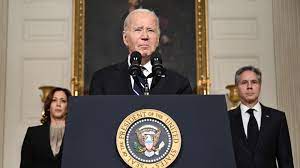Divergent Views on Biden’s Warning
In a series of interviews on Sunday, key figures in the U.S. Senate and House of Representatives expressed contrasting opinions regarding President Joe Biden’s cautionary stance on potential suspension of military aid to Israel.
Sen. Chris Coons’s Stance
Sen. Chris Coons, D-Del., articulated a nuanced position, indicating a willingness to halt the delivery of certain significant weaponry to Israel should Prime Minister Benjamin Netanyahu pursue a full-scale invasion of Rafah without adequate safeguards for civilian protection.
Rep. Michael McCaul’s Response
In stark contrast, Rep. Michael McCaul, R-Texas, chairman of the House Foreign Affairs Committee, criticized Biden’s warning, asserting that such messaging could convey precarious signals to both allies and adversaries.
Evaluation of U.S. Military Assistance to Israel
The divergence in opinions comes in the wake of a recent report from the Departments of State and Defense. The report, issued on Friday, acknowledges challenges in conclusively addressing individual incidents. However, it suggests a reasonable assessment that some U.S.-supplied defense articles may have been utilized by Israel in manners inconsistent with international legal obligations.
NSM-20 Report and Israeli Response
This report, commissioned by National Security Memorandum 20 (NSM-20), scrutinizes the deployment of U.S.-supplied arms in active conflict zones. Israeli authorities were briefed on the report’s findings around the time of its submission to Congress, as confirmed by a senior official in the Biden administration.
Navigating Diplomatic Waters
The contrasting viewpoints underscore the complexities surrounding U.S. military assistance to Israel and the delicate balance in diplomatic relations. As debates continue, the Biden administration faces the challenge of navigating these intricate dynamics while upholding national interests and international obligations.




